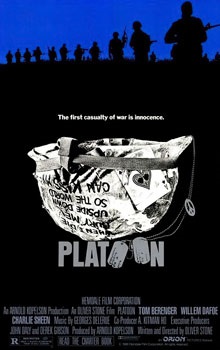
Oliver Stone has a reputation of being a polemicist first and an artist second, which is why I’ve never been particularly enthused about watching his films. Given that he’s still a major figure in American cinema, I thought I’d give him a fair shake and Platoon seems like the best place to start as it was what caused him to rise to prominence and is widely considered one of the best films about the Vietnam War.
Charlie Sheen is Chris Taylor, a middle class white boy who in a fit of idealism drops out of college to enlist for combat duty in Vietnam. His enthusiasm doesn’t last beyond a day in the sweltering jungle however as he discovers that in-fighting among the American soldiers is rife and that new recruits die so quickly that no one cares to even know their names. The conflict comes to a head when a member of their platoon is brutally mutilated and they raid a nearby village to search for those responsible. The Americans brutalize the villagers for little reason and the tough as nails Staff Sergeant Barnes shoots an elderly woman in the head for making a fuss. Another veteran sergeant Elias Grodin violently objects to the murder and swears that he’ll see Barnes court-martialed for the war crime. This causes the platoon to splinter into two opposing camps: one who thinks that all Vietnamese are scum and that the rules only force the Americans to fight with their hands tied behind their back and the other who are thoroughly disillusioned by the war and think that the Americans have no business being in the country.
Platoon must have made waves in the United States at the time because it won multiple Oscars but watching it now I feel that it doesn’t have much to commend it. It earned authenticity because Oliver Stone was himself an infantry soldier in Vietnam and it was based on his personal experiences. But its vision of Americans being the villains of the war is now mainstream. Even if that view was widely popularized by television shows like Tour of Duty, which was itself heavily inspired by this film, this means that everything that happens here is pretty much as you’re expect. There are no surprises and Chris Taylor’s character arc is entirely predictable. That the character is so obviously based on Stone himself might even be a detriment. The film wants the audience to walk away thinking that while Taylor did awful things in Vietnam, he is still at heart a good person and retains the crusader mentality that he started the film with, even if it has been turned in the opposite direction towards ensuring that everybody knows the truth of what happened.
The action scenes are solid and worth watching but everything else is only average or even mediocre. Stone’s shortcomings as a director is evident from the opening scene which has Taylor narrating his letter to his grandmother while heart-tugging strings play in the background. It’s too sentimental and too obvious to be really effective and using Taylor’s letters to provide exposition is such a clunky narrative device. The audience should be able to tell how Taylor’s emotions change over time from his interactions with his fellow soldiers, not because he tells his grandmother about it. Most of the dialogue suffers from the same problem. You can instantly tell how each of the characters falls into a readily familiar archetype and how Stone is using them to deliver a sermon about how awful the Americans were in Vietnam. This is why when Elias throws up his hands in the air as he falls to his knees near the climax, there’s little emotional affect. It feels unearned, as if Stone is borrowing a pose from somewhere else and not really having his characters feel it.
This isn’t to say that Platoon is a bad film. It is good but it’s just not good enough. It has no flair, no flash of brilliance, no great insight. Most of all, even though Apocalypse Now is not really about the Vietnam War, it occupies the same dark heart of humanity that Platoon is tentatively reaching for so thoroughly that it feels like there is little reason for this film that comes later to exist.